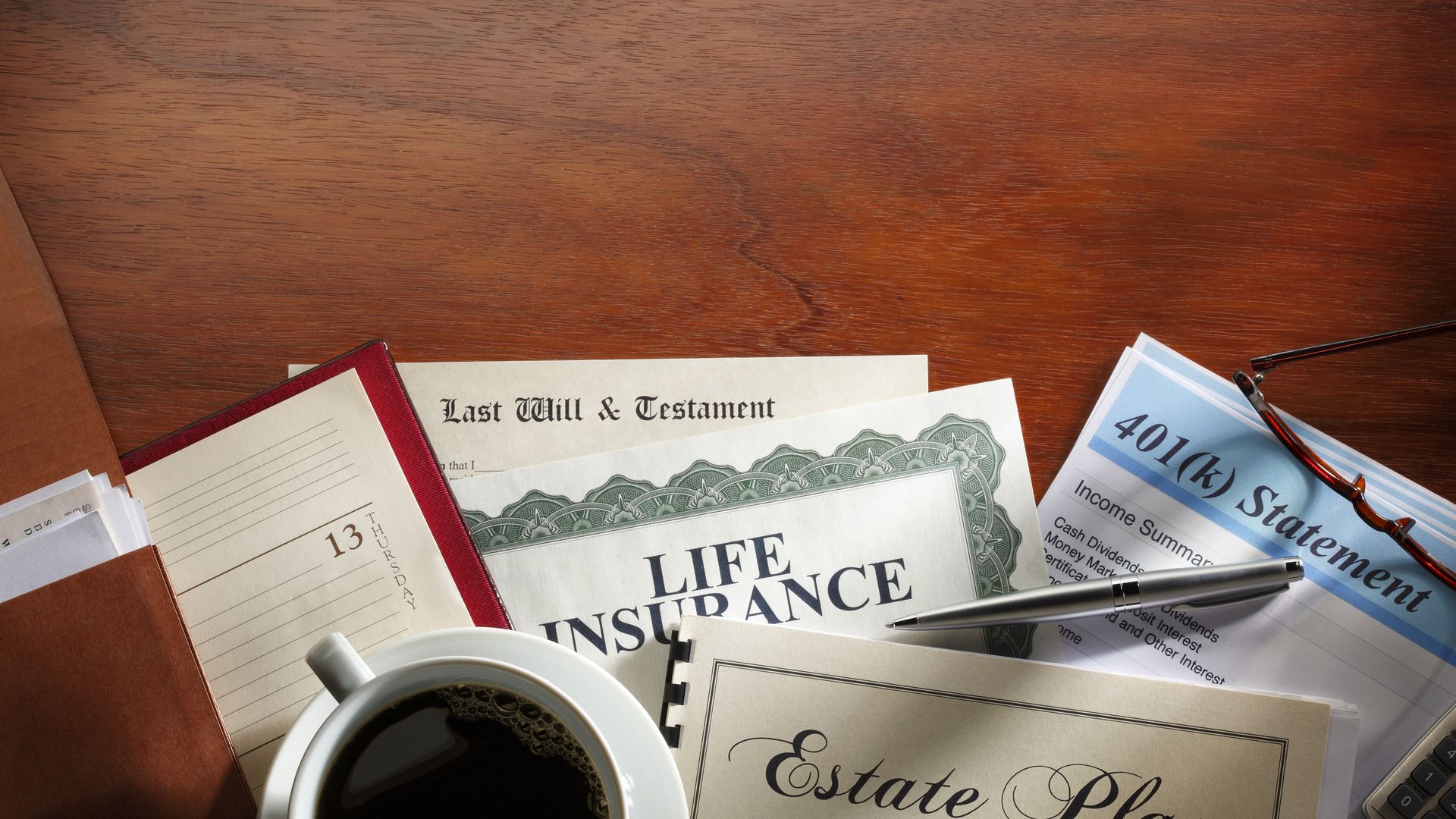How to Organize Your Financial Paperwork for Your Heirs
Organize your financial paperwork and make sure your family knows how to find it.


Even if your estate plan is in order, it won’t be of much help to your heirs if they can’t locate important documents when you’re no longer around. Organizing your financial and estate-planning documents — and letting your family know where you’ve stored them — will make it easier for your loved ones to care for you if you become incapacitated, and it will smooth the process of settling your estate after you’re gone. Plus, while you’re still alive, you’ll be able to quickly track down paperwork when you need it.
Sandra Batra, 56, created a binder to organize all of her father’s documents after he was stricken with cancer in 2011. Batra says the project helped her and her mother easily locate her father’s important documents while he was in the hospital.
After her father’s death in 2012, Batra decided to turn her idea into a business, LifeLink Consulting, which helps clients organize estate-planning documents into a binder or flash drive. Batra also gives clients blank worksheets they can use to provide other details, such as who they want to care for them and their end-of-life wishes. Her online course costs $99.

Sign up for Kiplinger’s Free E-Newsletters
Profit and prosper with the best of expert advice on investing, taxes, retirement, personal finance and more - straight to your e-mail.
Profit and prosper with the best of expert advice - straight to your e-mail.
To organize your own records, you can use an accordion file or binder and divide the documents into different categories, such as estate planning, life insurance policies, property titles and investment statements. You should also include categories for health insurance, long-term-care insurance, and bank account and credit card information. That way, your family will have the details they need to pay medical bills if you’re hospitalized for a long period.
Use Microsoft Word or Google Docs to write down additional details, such as who you want to take care of your pets, a list of subscriptions and memberships, and passcodes to any home security systems or online accounts. Once you draw up the documents, print them and place them in your binder (you can also store them digitally — more on that below).
Where to keep your documents
Store your documents in a secure area, such as a locked filing cabinet or fireproof safe in your home. Make sure your loved ones know the location of your cabinet or safe, and give them any keys, combinations or codes required to access it.
If you don’t want to keep the documents in your home, you can entrust them with your estate lawyer, says George Taylor, estate attorney with Brinkley Morgan.
“Your estate attorney can store original documents, like your will and titles to your house and car. Then you and the executor of your will can have copies,” he says.
You can put copies of your will and other important documents in a safe-deposit box, but it’s usually not a good idea to keep originals there if you’re the sole owner. After your death, the bank will seal the safe-deposit box until an executor can prove he or she has the legal right to access it. That could lead to long and potentially costly delays before your will is executed.
Digital options for financial paperwork
You should keep original, paper versions of your will, power of attorney and other key estate-planning documents. But if you’d like to create a backup of your paper documents, consider using a flash drive, which you can plug into your computer’s USB port, to collect them all in one place.
Alternatively, you can use a cloud storage system, such as Microsoft’s OneDrive or Apple’s iCloud. OneDrive’s free version gives you 5 gigabytes of cloud storage. Its family version, which allows up to six individuals to share and access documents, costs $99.99 a year.
Apple’s iCloud Drive provides 5GB of free storage. For 99 cents a month, you can upgrade to iCloud+, which provides 50GB of storage, and you can share it with up to five family members. Whichever option you choose, protect documents in the cloud by creating strong passwords and adding two-step verification.
Your heirs will need passwords to log in to your online accounts, so make sure they have easy access to them. You can write them down in a document to store in your binder or use a secure password-management tool. A family membership to 1Password ($4.99 a month after a two-week free trial) offers shared account access for up to five family members. With Bitwarden, you can share your account with one other person free. Or sign up for a family membership ($40 a year), which allows access for up to six people.
How to make updates in paperwork
Batra recommends updating your documents each time you have a life change. For example, you may need to alter the beneficiaries in your will or life insurance policies if you get divorced or have grandchildren, and living trusts should be updated to reflect the purchase or sale of property included in the trust. Even if you haven’t undergone any big changes, check your documents at least once a year to make sure the information is current.
If you entrusted your estate attorney with your documents, he or she can also help you keep them up to date, Taylor says. Ask your estate attorney to send you an annual e-mail or letter reminding you to update your information and make sure the right person is still in charge of your affairs, he says.
Key documents to share with your family
Make sure to include the following information in a binder or digital file:
- Will or trust
- Powers of attorney for finances and health care
- Organ donation form
- Living will
- Letter of instruction for your heirs
- Beneficiary designations
- HIPAA release (allows health care providers to share information about you with authorized individuals)
- Bank and financial statements
- Real estate deeds and titles
- Retirement-account documents
- Life insurance policies
- List of important personal property, such as jewelry and artwork, and estimated values
- Funeral instruction
Note: This item first appeared in Kiplinger Personal Finance Magazine, a monthly, trustworthy source of advice and guidance. Subscribe to help you make more money and keep more of the money you make here.
Related content

To continue reading this article
please register for free
This is different from signing in to your print subscription
Why am I seeing this? Find out more here
Get Kiplinger Today newsletter — free
Profit and prosper with the best of Kiplinger's advice on investing, taxes, retirement, personal finance and much more. Delivered daily. Enter your email in the box and click Sign Me Up.

Ella Vincent is a personal finance writer who has written about credit, retirement, and employment issues. She has previously written for Motley Fool and Yahoo Finance. She enjoys going to concerts in her native Chicago and watching basketball.
-
Five Top Causes of Business Bankruptcy and How to Avoid Them
Drawing from experience, this article explores the five biggest reasons companies go bankrupt and provides insights into the lessons learned from these case studies.
By Stephen Nalley Published
-
 Best U.S. Cities for Renters 2024
Best U.S. Cities for Renters 2024What are the best U.S. cities for renters? Charleston, NC, Atlanta, GA, Sarasota, FL, McKinney, TX and Scottsdale, AZ lead the pack, according to a recent RentCafe report.
By Kathryn Pomroy Published
-
 8 Great Places for Snowbirds to Land
8 Great Places for Snowbirds to LandThese affordable warm-weather cities for snowbirds offer plenty of housing options, abundant activities for retirees and access to good health care.
By Sandra Block Published
-
 Why Do People Retire in Florida? 9 Things You Must Know
Why Do People Retire in Florida? 9 Things You Must KnowAttention Florida-bound retirees: There's more to the Sunshine State than Disney, golf and beaches.
By Bob Niedt Published
-
 How Interest Rates Affect Annuities
How Interest Rates Affect AnnuitiesFind out why higher interest rates benefit some annuities more than others.
By David Rodeck Published
-
 How to Use Annuities for Retirement Paychecks
How to Use Annuities for Retirement PaychecksPredictable income can provide stability and peace of mind. Here’s how to decide whether an annuity is right for you — and sort through the options.
By David Rodeck Published
-
Are You Confident About Your Finances? Many Americans Are
More than 60% of Americans feel they are in better shape to reach their financial goals than the generations that came before them, according to a 2024 Schwab Survey
By Kathryn Pomroy Published
-
How to Get the Most Out of Your Pension
If you’re expecting a pension when you retire, your decisions on how it’s distributed could have long-term effects on your financial security.
By Sandra Block Published
-
 Widows Share Their Financial Strategies
Widows Share Their Financial StrategiesWidows discuss what helped - and would have helped - with finances and documents after their spouses' deaths.
By Janet Bodnar Published
-
The Particular Loss in a Close Friend's Death
The older you are, the more likely you are to lose close friends and face what some refer to as "disenfranchised grief."
By Alina Tugend Published



